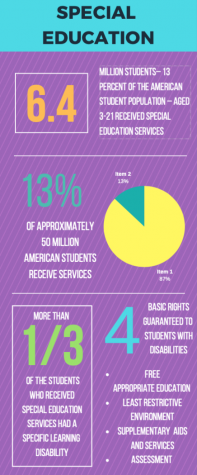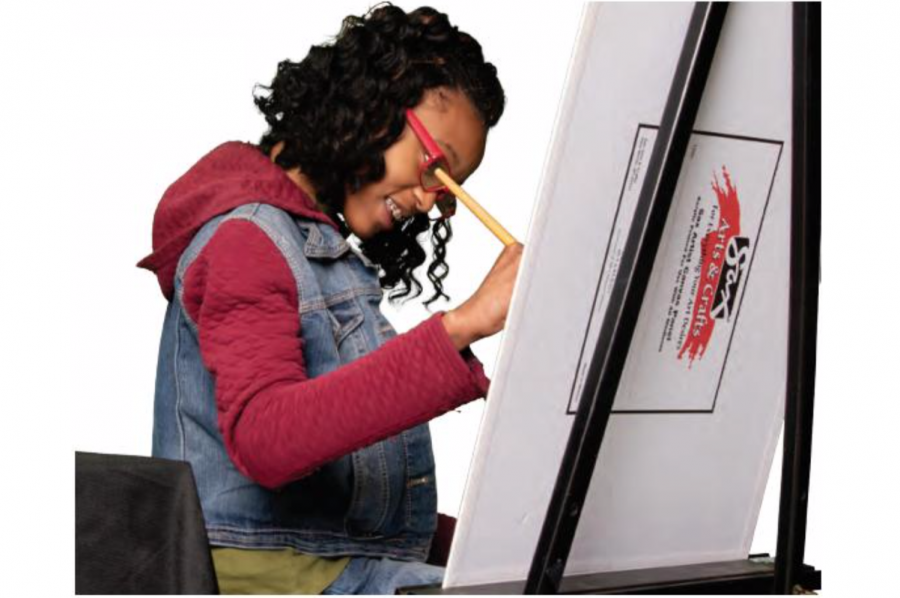A special population
Students reveal there's more to program than meets the eye
November 18, 2018
Photo by Rivers Edwards
Senior Auquasia Richard works on a painting. Richard created several paintings for her art class to express her creativity.
Special education. Those two words shouldn’t be so jarring, shouldn’t carry an undertone of discomfort when spoken aloud. Yet somehow, the words special education carry their own aura, one of mystery and whispers, as if everyone knows what the secret is, but no one’s brave enough to say anything. Afraid of violating the Family Educational Rights and Privacy Act or being politically incorrect, people opt for silence instead, as if ignoring an entire population isn’t just as painful.
Students with special needs are just that— students. They go to class, make grades, go to lunch and have after school hobbies. They are unique and diverse, and lumping all special needs students under one label— or one room number— is fair to no one. Everyone has a story, so why hasn’t this one been told?
Senior Auquasia Richard is 17 years old. She loves painting, swimming and getting pedicures with her mom, Shasta Richard. She was also diagnosed with sensory integration disorder, autism and ADHD when she was 3 years old.
“I started noticing different signs that she wasn’t catching on and she was behind her peers, so we got her into Opportunities and started doing therapy to decrease some of those obstacles she struggles with,” Richard said. “Most of the time she is a loner in everything. She is kind of standoffish until you make her comfortable with her being around you, but after that, she’s like this butterfly. She has come a long way since she began high school, a very long way.”
Though Auquasia’s story seems unconventional, the way the proud mother describes her daughter never changes.
“I wanted to expand to see what it is that she likes,” Richard said. “Then they put her in art, and she loves painting. She just loves everything about painting. She just kinda doodles [all the time], and she just takes her time where somebody else might do it a little faster than her. She’s also been swimming for four years, so she’s really good at swimming. She swims like a mermaid.”
Unfortunately, not everyone shares the admiration Shasta has for her daughter. Many kids and adults alike seem to exclude students with special needs.
“I feel that a lot of times a child with special needs is shunned,” Richard said. “[People think] ‘I don’t want to deal with them, it’s too much of a problem. They may cause embarrassment or they don’t know how to act.’ There’s just a lot of obstacles and barriers that they go through.”

Though Richard fully supports her daughter in all of her endeavors, she is keenly aware of the stigma that surrounds special needs students. She, however, isn’t the only person to make note of this issue.
Ashley Alexander, a 2003 Texas High graduate, has also felt the effects of stigmatization due to being a part of special needs.
“I feel that at times I was looked down by my peers for having a learning disability,” Alexander said. “The best part of having an IEP plan was when I needed extra help or more time, I was able to have that. The worst part of having an IEP plan was some of my teachers just got to know my plan versus me as student.”
The scope of what special education is is quite expansive, but it is often viewed through a narrow lens. The role it plays in the lives of those with disabilities is different to each individual. Every person faces different hardships and triumphs. This is true for all people, and 2016 Texas High graduate Mackenzie Tellez is no exception. As a child, Tellez was diagnosed with cerebral palsy and was a part of the special education program all throughout high school.
“Overall, the Texas High special education program was amazing,” said Amy Tellez, Mackenzie’s mother and special needs diagnostician. “The teachers encouraged her and very few ever told her she couldn’t do something.”
One would think that it is the disability itself that causes problems, but oftentimes is the way in which the disability is handled from an educational standpoint.
“Right before the STAAR test in Mackenzie’s ninth or tenth grade year, her accommodations were taken away without us knowing,” Tellez said. “She wasn’t going to have her tests read to her when she struggled with comprehension. We met at the end of the year requested an evaluation to see exactly where everything fell, and the evaluation revealed that Mackenzie had an intellectual disability, not a specific learning disability, and was able to receive all of her accommodations.”
A solid support system in schools is vital to all students, especially those with special needs.
“Special education is an individualized instruction that is based on the student’s individual need. Not everyone learns the same way on any given day, that includes all students,” Tellez said. “Special education is designed to help those students who continue to struggle to learn and cannot retain the information as typically developing peers do.”
The parents of special needs children find themselves in a unique position. They must balance their instinct to protect their children from criticism with their desire to push them to be more active in society.
“I do believe it is a two-fold process as parents. You have to migrate your kids into the community so that they can be more aware of what’s going on around them,” Richard said. “Sometimes as special needs parents, we kind of shelter them because we don’t want them to get hurt or we don’t want to anyone to make fun of them, but at the same time, you have to get them out there.”
The exclusion of special needs students is a complicated issue. As a society, we must ensure we are doing our part in taking a step back from the human instinct of stereotyping and moving forward in a way that includes everyone.
“I am a parent and I want my child to be included. Don’t leave them behind,” Richard said. “I just want my child to be treated equally. I’m not asking for any special favors for Auquasia. Treat her like you would treat anybody else, but at the same time, do consider where her level is. Just don’t say I can’t be bothered.”
While being the parent of a child with disabilities comes with its hardships, Richard believes the reward is far greater. Every person has something to offer, and individuals with special needs are no exception.
“There is a lot that goes into being a parent, and Auquasia has taught me so much. [She taught me to] just see people for who they are. I never thought that I would be the parent of a special needs child,” Richard said. “Auquasia has taught me to not just look at the outside, but look at the inside. Don’t look at my disability. Look at my ability to get things done.”
Fear causes silence, and silence causes fear. This paradox creates the culture of being afraid to talk about special needs, and it can only be broken when parents are brave enough to speak up.
“I’m not scared to talk about it,” Richard said. “The reason why I’m not scared to talk about it is because I feel like if it reaches one person, if it reaches one parent, I feel like we’ve accomplished something. As parents, we don’t want our children to be labeled. We don’t want them to be scared of the other kids or that there’s going to be some type of ridicule. For me it’s more like I want [special needs students] to know that they have a voice. I’m an advocate for my daughter. It’s never about me, it’s always about her, what I can do to make it better.”
And though there has been progress made by these involved parents and dedicated teachers in past years, there is still a long way to go to reach equality.
“My prayer is that Texarkana Independent School District works to create a pathway program and policy that shows inclusivity to all student populations, especially those who tend to be marginalized due to mental, physical or social challenges,” Richard said. “I have yet seen a program designed to help those students who fall under the special education umbrella develop skills to become successful in the real world. Remember the student is only going to be as strong as the foundation it is built upon.”

